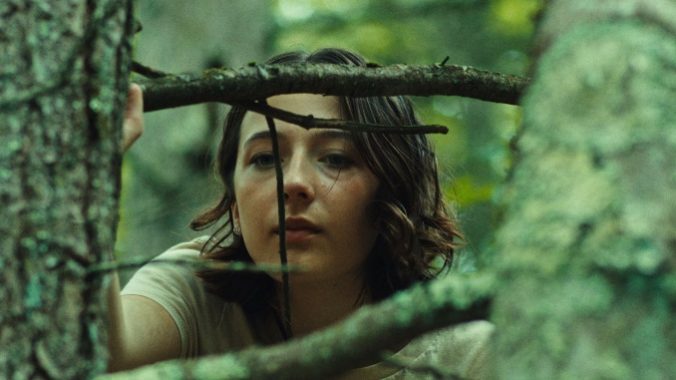Good One Is a Strikingly Observant Coming-of-Age Short Story in Movie Form

India Donaldson’s Good One trades in voyeurism, but not necessarily the type you’d expect from a nervy Sundance debut. Low-key in approach but deeply observant, much of the movie involves Sam (Lily Collias), a 17-year-old girl, watching and listening in plain sight. Sam’s dad Chris (James Le Gros) and his longtime friend Matt (Danny McCarthy) know that she’s there; sometimes, they even address her directly, or solicit her opinion about this or that, as the three of them embark on a camping trip. But neither of them are quite accustomed to how clearly Sam sees them, and how attuned she is to their middle-aged weaknesses, whether she’s amused or deeply disappointed. Chris and Matt seem to take their status as the adults in the room (or, in this case, in the woods) for granted, even as they’re giving lip service to Sam’s maturity.
The audience better understands Sam’s watchfulness because Donaldson zeroes in on the face of her young lead, catching Collias in a range of expressions that far eclipse the stereotypical teenager repertoire of eyerolls and glowers. Those are there too, sometimes, but Sam also exhibits a kind of flickering skepticism over whether she can give these men the benefit of the doubt – or, in her father’s case, years of both love and frustration. Sam is weeks away from starting college, and you can almost see her performing the calculations of whether it will be easier to press her father or acquiesce to his self-centeredness and keep getting along to go along.
Having Matt there breaks tension at first, but ultimately may not be worth the levity he tries to bring. The lopsided camping trio is supposed to be a squared-off quartet, but Matt’s son, only glimpsed at the beginning of the film, bows out following some kind of hotheaded exchange with his sometimes blunt-spoken semi-failed-actor dad. Matt insists on proceeding as planned, and the remaining hikers head out of a damp summer-season New York City and into a forest upstate. There they will hike eight or nine miles per day, even if (as Chris sighs) Matt brings impractical jeans instead of shorts, overloads his backpack with pointlessly heavy freight (including, hilariously, a copy of the substantial tome Shogun, which self-evidently goes unread), and forgets his sleeping bag in the car. Chris’s ribbing of his friend is chased with a scolding sense of superiority; Chris is obviously the self-appointed expert in exercise and more disciplined self-care, boasting a somewhat trimmer dad-bod and, for that matter, a somewhat tidier midlife divorce, with a vastly more understanding child than Matt’s sullen son.
-

-

-

-

-

-

-

-

-

-

-

-

-

-

-

-

-

-

-

-

-

-

-

-

-

-

-

-

-

-

-

-

-

-

-

-

-

-

-

-








































